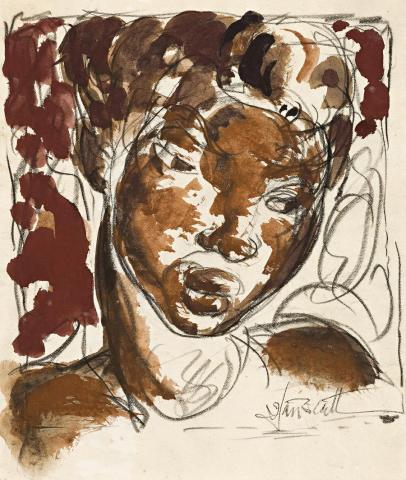SKETCH HEAD, 1941
IAN FAIRWEATHER
gouache and pencil on paper on board
24.5 x 20.5 cm
signed lower right: IFairweather
Collection of Lina Bryans, Melbourne
Thence by descent
Private collection, Melbourne
Fairweather: a Retrospective Exhibition, Queensland Art Gallery, Brisbane, 3 June – 4 July 1965; Art Gallery of New South Wales, Sydney, 21 July – 22 August 1965; National Gallery of Victoria, Melbourne, 9 September – 10 October 1965; National Gallery of South Australia, Adelaide, 26 October – 21 November 1965; Western Australian Art Gallery, Perth, 9 December 1965 – 16 January 1966; Tasmanian Museum and Art Gallery, Hobart, 10 February – 13 March 1966, cat. 83 (label attached verso)
Ian Fairweather 1891–1974, National Gallery of Victoria, Melbourne, 25 September – 6 November 1991 (label attached verso)
The Drawings of Ian Fairweather, National Gallery of Australia, Canberra, 21 June – 24 August 1997; Art Gallery of New South Wales, Sydney, 17 October – 7 December 1997; Queensland Art Gallery, 7 February – 29 March 1998 (label attached verso)
Fisher, T., The Drawings of Ian Fairweather, National Gallery of Australia, Canberra, 1997, p. 22 (illus.)
Ian Fairweather's drawings are so highly thought of that, in 1997, Canberra's National Gallery of Australia devoted an entire exhibition to them. Sketch Head, 1941, with its wonderful freedom of line and overall visual excitement, was among them. The exhibition's curator, Tim Fisher, thought so highly of Sketch Head that he singled it out as one of 'four of the most beautiful works in the exhibition'.1 Painted in Calcutta, India, this exceptional group of works includes Landlady and Daughter, 1941 (Deutscher and Hackett April 2013 lot 13), and the Chinese landscapes, Lake Hangchow, 1941 (National Gallery of Australia), and Bridge in Soochow (Sussan Corporation Collection, Melbourne). All were recollections of his recent and more distant past, Sketch Head and Landlady and Daughter being of the time he spent at Alligator Creek, Cairns in 1939 sharing a boathouse with the Aboriginal family.
The liveliness of Sketch Head is in contrast with its reflective genesis, the whole realised in remarkable brevity of line and economy of colour. This is achieved as much through the line as the brushwork, as Fairweather married his London training with Chinese art. As Fisher put it, 'The quick, arabesque muscle lines of the Slade School undergo a radical transformation: they become a discursive, wandering outline', adding an admiration of 'the light flickering dance of a calligrapher's brush'.2 He employed such an economy of means that even the paper support showing though was used to develop form or create highlights as integral parts of the composition. The unpainted has become part of the very image itself, furthering the liveliness of the picture surface and its two dimensional design. And then the light, quickness of touch is anchored by the depth of the few colours employed. This disarming directness and seeming simplicity of statement conversely reveals a depth of perception in his lifelong interest in people. As curator Robert Smith said in his catalogue introduction to the 1965 retrospective exhibition, 'In his paintings Ian Fairweather has always been concerned with people - not as individuals, not as types, but as people: part of the vast unfolding tapestry of life.'3 While there is a strong emphasis on formal values in Sketch Head, this in no way detracts from the nobility and affection shown, of Fairweather's quite remarkable feeling for children.
1. Fisher, T., The Drawings of Ian Fairweather, National Gallery of Australia, Canberra, 1997, pp. 11-12
2. Ibid., p. 7
3. Smith, R, 'Introduction', Fairweather: A Retrospective Exhibition, Queensland Art Gallery, Brisbane, 1965
DAVID THOMAS
